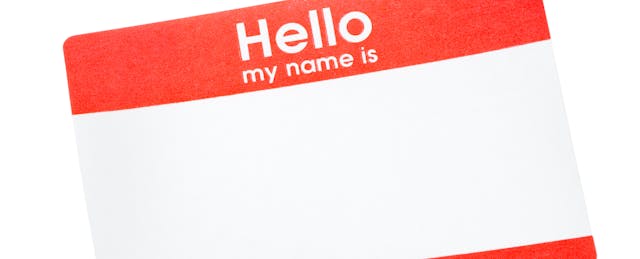When Tresor Brill enters a classroom for the first time at the start of each semester, she knows what to expect: readings, class discussions, homework—and the professor mispronouncing her name (which should be pronounced “tray”-”soar”).
Brill, an English major starting her senior year at Rice University, says hearing her name butchered by the professor is not exactly insulting, but it does cause discomfort.
“It creates the sense that my teacher doesn't really care about saying your name right,” she says.
Learning names at the beginning of the term has long been a challenge for instructors—especially when the names are ones professors have never encountered before. There are companies like NameCoach that give professors a way to hear and review the correct pronunciation before classes even begin.
The Redwood City, Calif.-based company lets students record their own names and pairs the recordings with campus systems so that professors can listen to them as they review their rosters. Stanford University and Northwestern University are among the higher education institutions that use NameCoach.
Ritika Dewan, director of partner community development for the company, says the tool helps “make those first interactions very easy and very comfortable” for professors at the start of class.
Dewan says her first name can be tricky to pronounce, and recalls participating less in classes where the professor mangled her name throughout the semester. “The process of confirming and reconfirming my name was awkward to me and sometimes made me feel singled out. It may have been awkward for the instructors as well, which is exactly what our tool helps solve.” And she says even students with seemingly simple names “jump at the opportunity” to record their names.
For commencement ceremonies, some colleges will send out emails to graduates asking them to record their names as they want them said, so that the person reading names at graduation can review those to practice.
Of course, the problem of properly pronouncing names is not unique to higher education. Another company, NameShouts, offers its tools for educators and businesspeople who want to pronounce the names of their students and customers correctly.
Many people can say their names have been mispronounced at some point in their lives. But those who have names that don’t fit within white American standards experience this more than others. For example, at the 2013 Oscars, celebrity reporter Ryan Seacrest failed to pronounce the name of child actress Quvenzhané Wallis, referring to her instead as “Little Q.” Writer Tracy Clayton argued that the same treatment wouldn’t happen for many white actors, even those with difficult names to pronounce.
“The problem is that white Hollywood, from Ryan Seacrest and his homies to the AP reporter who decided to call her “Annie” rather than her real name, doesn’t deem her as important as, say, Renee Zellweger, or Zach Galifianakis, or Arnold Schwarzenegger, all of whom have names that are difficult to pronounce—but they manage. The message sent is this: you, young, black, female child, are not worth the time and energy it will take me to learn to spell and pronounce your name.”
Yee Wan, director of Multilingual Education Services at the Santa Clara County Office of Education, says a person’s name is how he or she navigates through the world, and properly pronouncing someone’s name validates their identity.
“By pronouncing students’ names correctly, you can foster a sense of belonging and build positive relationships in the classroom, which are crucial for healthy social, psychological, and educational outcomes,” Wan says.
Wan founded the “My Name, My Identity” initiative. The goal is to “build a more inclusive, respectful culture by asking educators and community members to make a pledge honoring students, neighbors, and coworkers by promising to learn how to pronounce their names correctly.”
At San Francisco State University, associate professor of journalism Rachele Kanigel says the diverse student body makes for a rich learning experience, but also means names on the roster that are difficult to pronounce.
“I struggle every semester when I get a new batch of students with names and trying to remember how to pronounce them,” Kanigel says. “Usually what I do is I’ll call out the roll, apologizing for mispronouncing their names, and then I’ll encourage students to say their names in the first couple of weeks when they’re speaking in class.”
And she says she knows the feeling. She’s often called Rachel, when the correct pronunciation is "rach"-"elle." Also, “people struggle with my last name, so I’ve been in the shoes of the students too, whose names are mispronounced," Kanigel says.
Kanigel she believes the issue of name pronunciation is growing as diversity is growing within higher education.
“At San Francisco State, we’ve always had a diverse student body, and we’ve always had a lot of immigrants and international students, but I would say even though we’ve always had it, it's getting more diverse,” she says.
Kanigel said she would use a tool like NameCoach to help her better pronounce her students’ names. “If it worked well, I would definitely use it,” she says.


